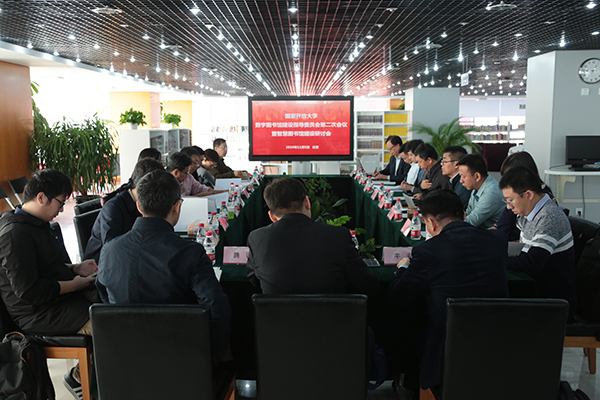 On 5 November 2019, the Open University of China (OUC) held the second meeting of the digital library construction steering committee, along with a seminar on smart library construction. The meeting focused on the construction of the OUC Smart Library and the transformation of the libraries in the OUC school-running system in the information era, and put forward opinions on the OUC Smart Library Construction Plan.
On 5 November 2019, the Open University of China (OUC) held the second meeting of the digital library construction steering committee, along with a seminar on smart library construction. The meeting focused on the construction of the OUC Smart Library and the transformation of the libraries in the OUC school-running system in the information era, and put forward opinions on the OUC Smart Library Construction Plan.

Jing Degang, secretary of the Party committee and president of the OUC, pointed out at the meeting that the digital library is the neural centre of the OUC’s learning resources. At this stage, it is necessary to build a revolutionary and subversive OUC smart library based on artificial intelligence and the 5G era. The smart library should be in line with the characteristics of the OUC and meet the needs of building a learning society that anyone can learn anytime and anywhere. Jing Degang put forward further requirements for the construction progress and standards of the smart library, hoping to push forward the work as soon as possible on the basis of extensive consultation and strive to achieve results within one year.

The experts present at the meeting affirmed the construction objectives, contents, and methods proposed in the OUC Smart Library Construction Plan, and put forward suggestions for the implementation. Sun Tan, vice president of the Chinese Academy of Agricultural Sciences and member of the Party group, pointed out that the construction of the smart library is a priority if the library is to meet the characteristics of the OUC, which serves the needs of the national development strategy and reflects the features of "wisdom, openness, mobility, and integration.” Chen Lingqiang, deputy director of the management centre of the China Academic Library & Information System (CALIS), Peking University, and secretary general of the National Library and Information Work Steering Committee of the Ministry of Education, stressed that the construction and application of the smart library should be sustainable. Song Jifang, executive deputy-chief librarian of the library of Renmin University of China, believes that the content of the scheme is comprehensive and the design is complete, consistent with the direction of the next-generation digital library in general colleges and universities, and those references can be drawn from each other during implementation. Dou Tianfang, deputy-chief librarian of Tsinghua University library, pointed out that the basis of intelligence is the digitalisation of resources. During the process of implementation, resources should be further studied and subdivided from the perspective of data. Cui Lin from the OUC Faculty of Science and Engineering noted that interactive learning resources can be generated with the help of an intelligent library in order to promote the reform of online courses. Deng Nan, vice president of OUC’s Hunan Branch, said that the program proposed new ideas, technologies, services and content for the library work of the open universities within the OUC school-running system, placing high expectations on the OUC smart library.
Experts and technicians from China Unicom, Baidu, Huawei, Tencent, Ping An Group, and other enterprises also attended the meeting. Li Linshu, vice president of the OUC, presided over the meeting and made arrangements for future work.
Written by Zhou Xiang and Fu Bo, photographed by Zhuge Huanyu, OUC